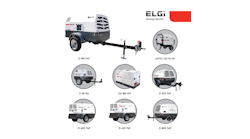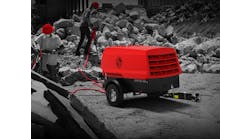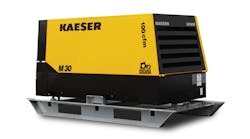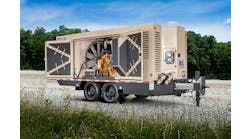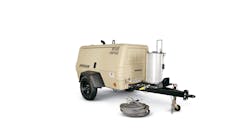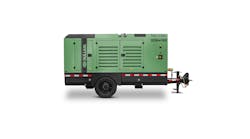To maximize the number of air compressor rentals before a breakdown, always buy quality products and perform the recommended scheduled maintenance. Following these standards will ultimately lower repair costs and increase rental revenue.
The quality of the air compressor can be determined by the construction of the tank/frame assembly and the brand of basic compressor pump. Using a brand name will result in less maintenance as well as longer life.
Quality tank/frame assemblies have a low-gauge steel thickness and expertly welded tanks. A helpful hint: When welding tanks larger than 6 inches in diameter, an ASME-certified welder must do the work, as quality welds will limit tank leakage and compressor downtime.
A low vibration level is also important. Like a pressure washer, air compressors have a base plate on which the engine and compressor pumps are mounted. The thickness of the plate, sometimes called the saddle, will limit vibration if it is thick enough. Many times when vibration occurs in the belt guard area, it is so loud that it can ruin a customer's impression of an otherwise quality piece of equipment.
Machines with the ability to stamp belt guards will have less vibration. Stamped openings also contribute to proper compressor cooling: The flywheel air fins blow air past the compressor's head, maintaining a proper operating temperature.
When looking for an air compressor, pay attention to external components that can be damaged by other equipment transported with it. Most units manufactured with a copper line between the compressor pump and the tank inlet will eventually have this problem. Routing the tubing properly to keep it out of the way will sometimes work. However, the use of a stainless steel braided hose will provide a more professional construction.
As manufacturers, we've found that building units with specialized fittings that keep the components close to the tank area prevent damage to regulators, unloaders, gauges and relief valves.
Maintenance Starting a maintenance schedule before renting a piece of equipment will prove beneficial to the life of the air compressor. On all new equipment, break-in maintenance needs to be performed after the unit has been used for 25 hours. This will include changing the engine and compressor oil.
After the first 25 hours of operation, the engine, pump crankshaft and connecting rods will wear, forming a bearing surface between the two components. This break-in period will cause some debris to collect in the oil reservoir. The temperature will also run slightly higher, causing the oil to break down faster. Changing the oil at this time will clean the debris from the system and give the crankcase a fresh start for the next 100 to 200 hours of operation.
Three areas that need to be checked daily on any gas-powered air compressor are engine oil, compressor oil and tank drains. Engine oil should be checked daily and changed every 100 hours or three months. Pump oil should be checked daily and changed every 200 hours or six months. The tank drains should be opened daily or after each rental to drain condensation. Never attempt to drain these components without first relieving the system pressure.
Draining the tank will prevent it from rusting or corroding and will extend the unit's life. The compressor should then be run to ensure that no excessive vibrations occur, all safety guards are in place, and there are no leaks.
Maintenance done on a weekly basis involves pulling on the ring of the pressure-relief valves to make sure they are operating properly - air pressure should escape when the ring is pulled. You will also want to clean the exterior surfaces of the compressor. Check the air filter and replace it if necessary, and look for any air or oil leaks.
On a monthly basis, rental centers should check their compressors' belt tension and flywheel retaining screws.
Following these recommended maintenance checks will help extend a compressor's life and prevent failure during rental. Your customers will also appreciate the dependability of your air compressor selection.
Using the correct oil is critical to compressor life and must be followed. When choosing oil, keep the ambient temperature in mind. Use the following chart as a guide to get the correct oil viscosity. But note: Use only non-detergent oils in the compressor pump. Detergent oils are not recommended because they have a tendency to foam when used in compressors.
